人教新目标版英语九年级全Unit 4 I used to be afraid of the dark. Section A 3a-4c课件+嵌入音频(42张PPT)
文档属性
| 名称 | 人教新目标版英语九年级全Unit 4 I used to be afraid of the dark. Section A 3a-4c课件+嵌入音频(42张PPT) | 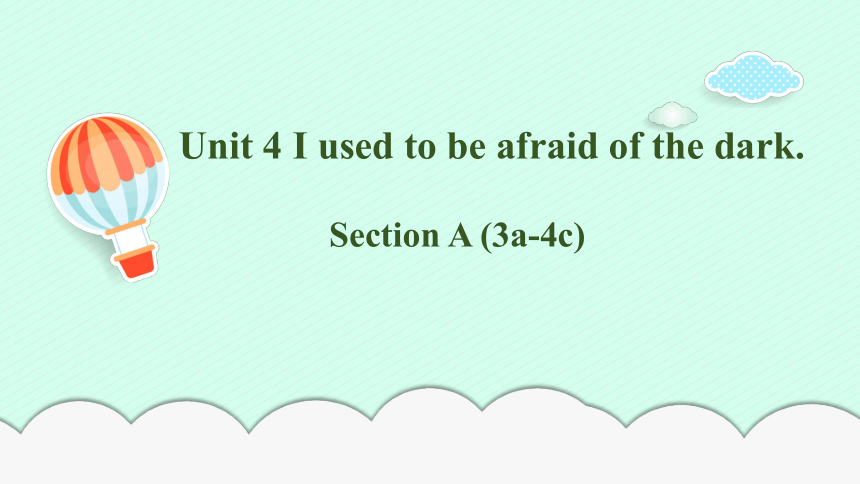 | |
| 格式 | pptx | ||
| 文件大小 | 26.2MB | ||
| 资源类型 | 教案 | ||
| 版本资源 | 人教新目标(Go for it)版 | ||
| 科目 | 英语 | ||
| 更新时间 | 2021-08-24 00:38:34 | ||
图片预览

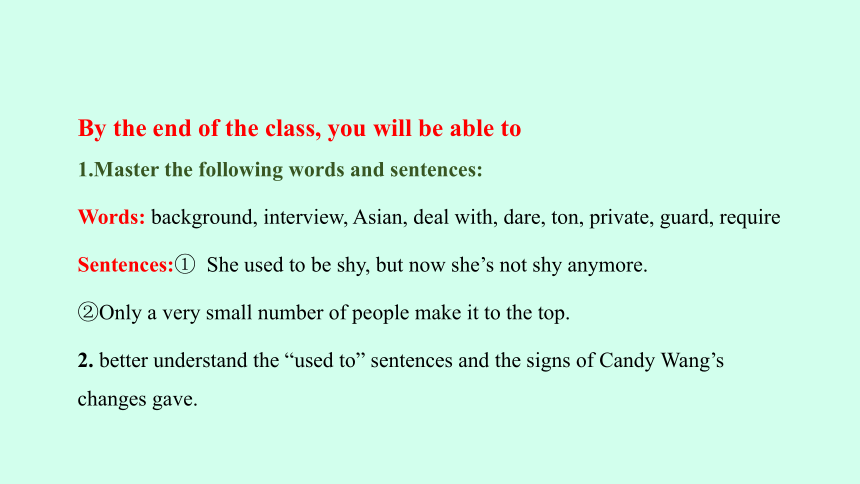
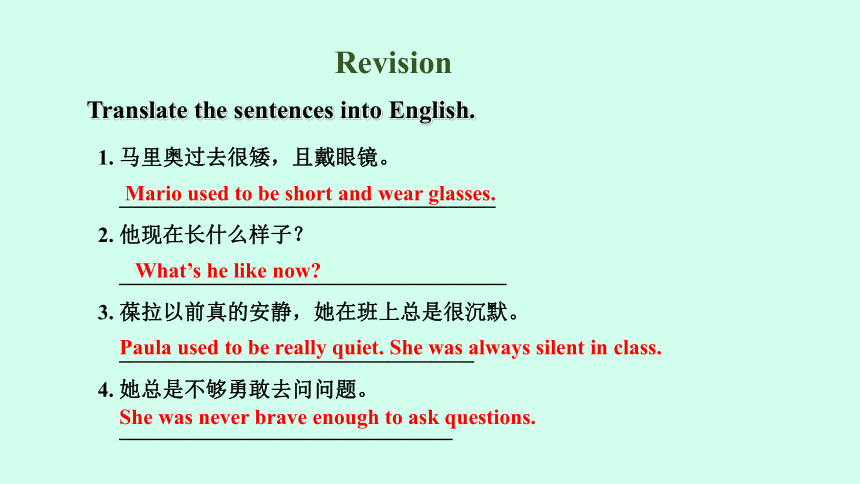
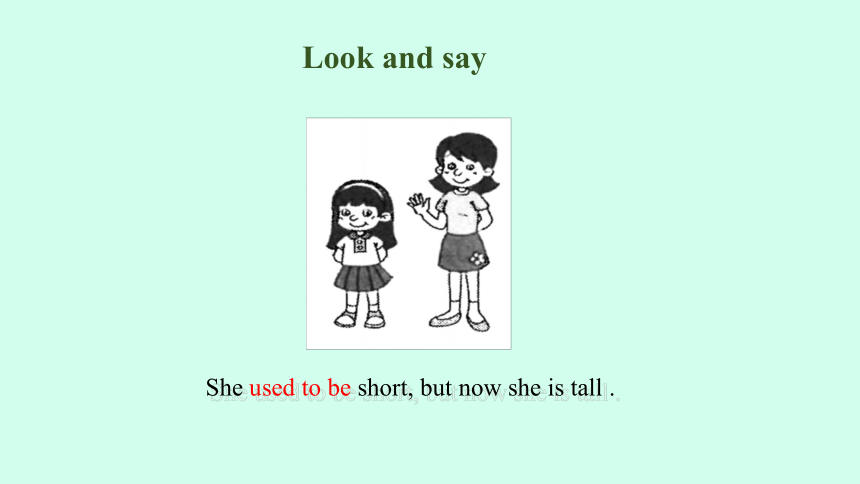

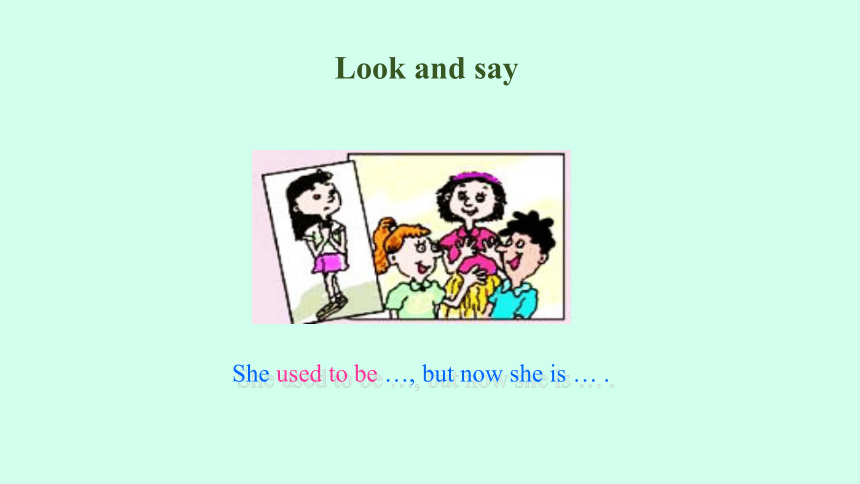
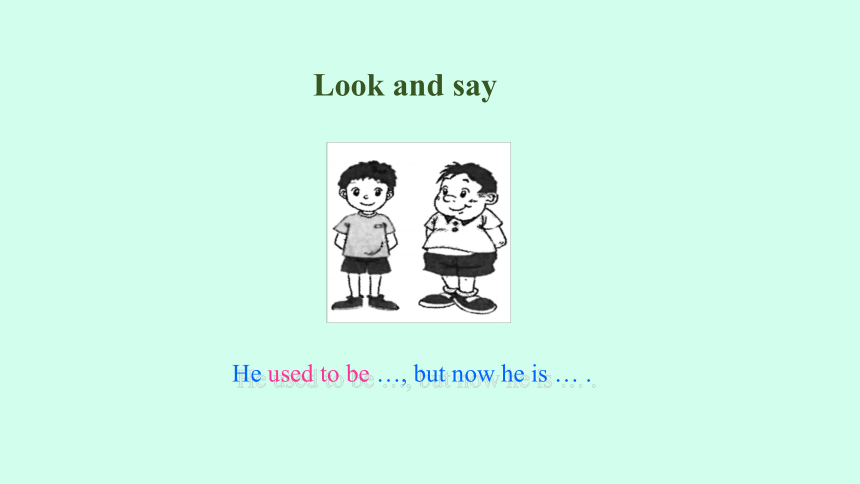
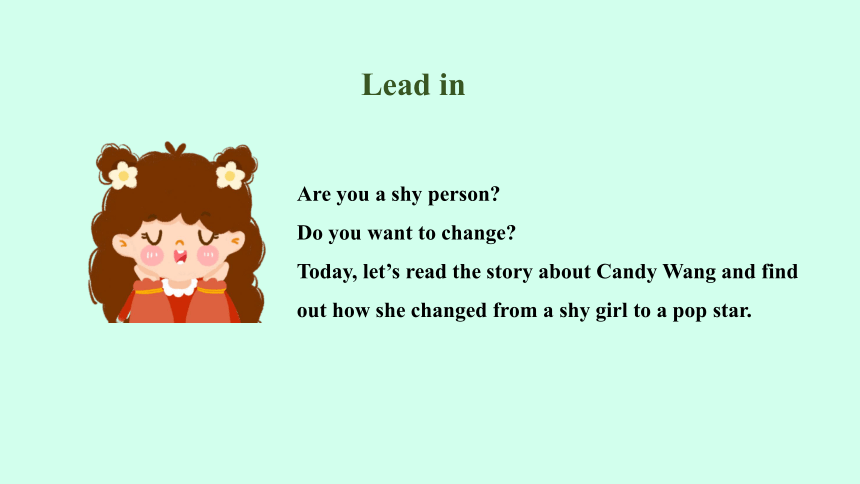
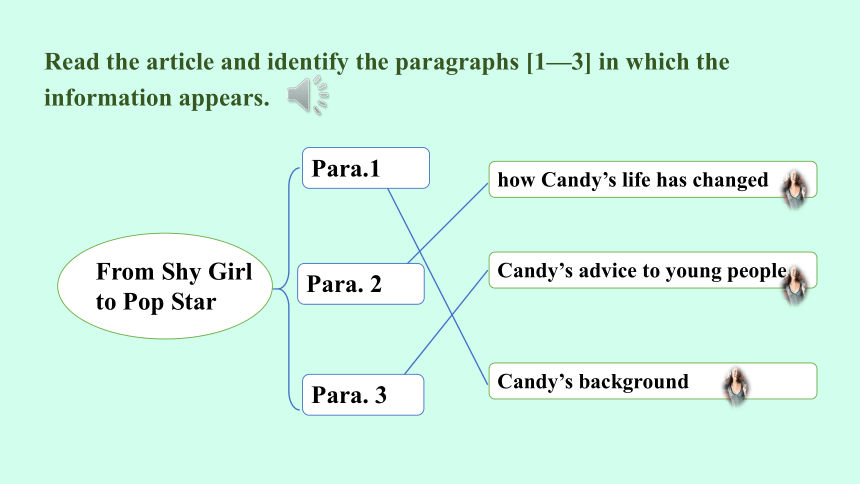
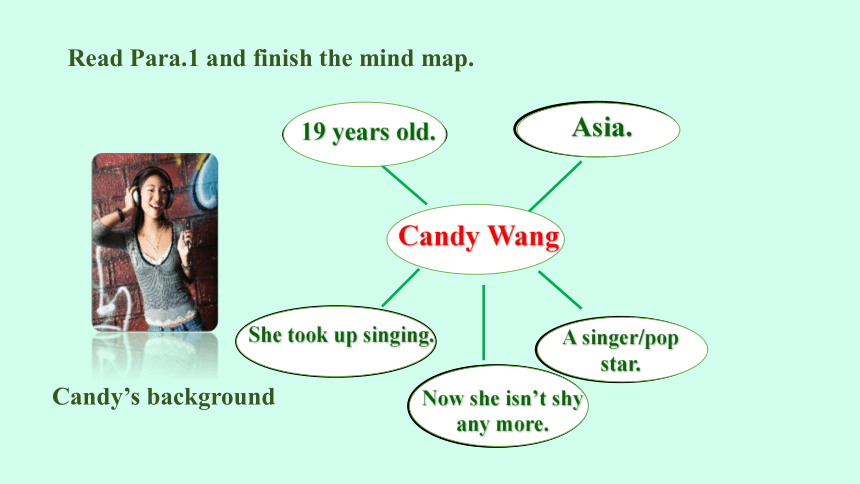
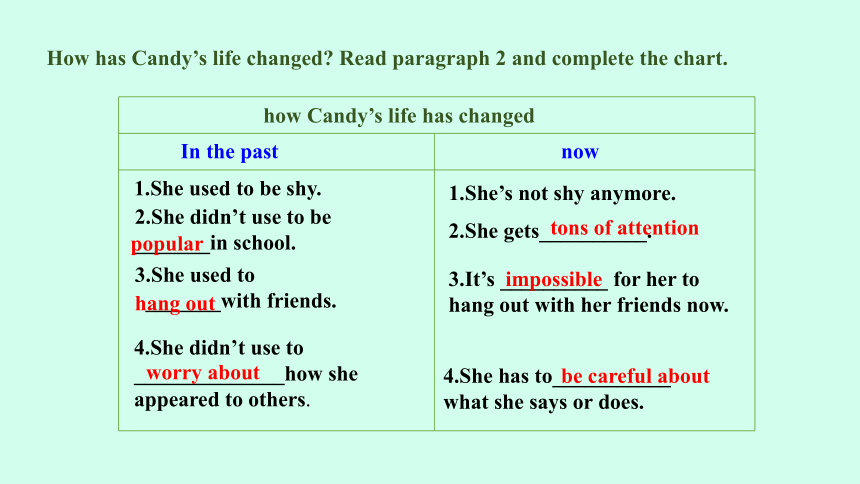
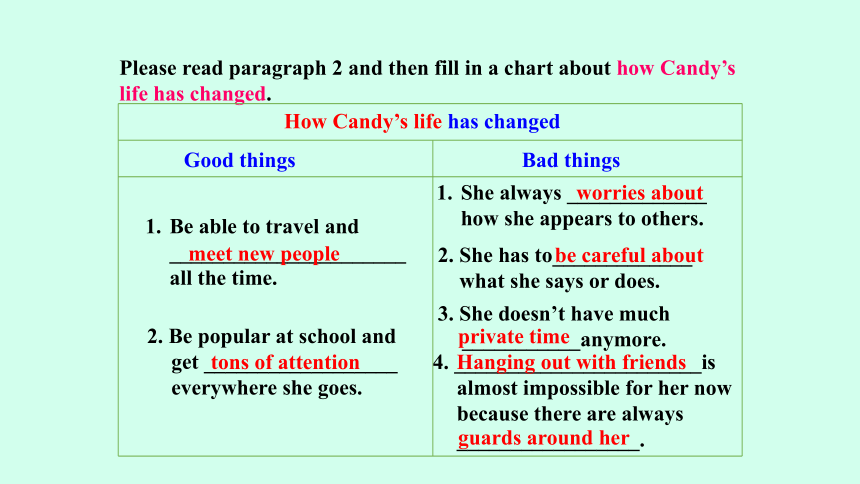
文档简介
(共42张PPT)
Section
A
(3a-4c)
Unit
4
I
used
to
be
afraid
of
the
dark.
By
the
end
of
the
class,
you
will
be
able
to
1.Master
the
following
words
and
sentences:
Words:
background,
interview,
Asian,
deal
with,
dare,
ton,
private,
guard,
require
Sentences:①
She
used
to
be
shy,
but
now
she’s
not
shy
anymore.
②Only
a
very
small
number
of
people
make
it
to
the
top.
2.
better
understand
the
“used
to”
sentences
and
the
signs
of
Candy
Wang’s
changes
gave.
Revision
Translate
the
sentences
into
English.
1.
马里奥过去很矮,且戴眼镜。
___________________________________
2.
他现在长什么样子?
____________________________________
3.
葆拉以前真的安静,她在班上总是很沉默。
_________________________________
4.
她总是不够勇敢去问问题。
_______________________________
Mario
used
to
be
short
and
wear
glasses.
What’s
he
like
now?
Paula
used
to
be
really
quiet.
She
was
always
silent
in
class.
She
was
never
brave
enough
to
ask
questions.
Look
and
say
She
used
to
be
short,
but
now
she
is
tall
.
She
used
to
be
…,
but
now
she
is
…
.
quiet
…
outgoing
…
Look
and
say
She
used
to
be
…,
but
now
she
is
…
.
Look
and
say
He
used
to
be
…,
but
now
he
is
…
.
Look
and
say
Are
you
a
shy
person?
Do
you
want
to
change?
Today,
let’s
read
the
story
about
Candy
Wang
and
find
out
how
she
changed
from
a
shy
girl
to
a
pop
star.
Lead
in
Read
the
article
and
identify
the
paragraphs
[1—3]
in
which
the
information
appears.
Para.1
Para.
2
Para.
3
From
Shy
Girl
to
Pop
Star
how
Candy’s
life
has
changed
Candy’s
background
Candy’s
advice
to
young
people
Candy
Wang
How
did
she
deal
with
her
shyness?
Was
she
shy
before?
And
now?
Candy’s
background
What
does
she
do?
How
old
is
she?
Where
is
she
from?
19
years
old.
Asia.
A
singer/pop
star.
Yes,
she
used
to
be
shy.
She
took
up
singing.
Now
she
isn’t
shy
any
more.
Read
Para.1
and
finish
the
mind
map.
How
has
Candy’s
life
changed?
Read
paragraph
2
and
complete
the
chart.
1.She
used
to
be
shy.
how
Candy’s
life
has
changed
In
the
past
now
2.She
didn’t
use
to
be
_______in
school.
3.She
used
to
_______with
friends.
4.She
didn’t
use
to
______________how
she
appeared
to
others.
1.She’s
not
shy
anymore.
2.She
gets__________.
3.It’s
__________
for
her
to
hang
out
with
her
friends
now.
4.She
has
to___________
what
she
says
or
does.
popular
tons
of
attention
hang
out
impossible
worry
about
be
careful
about
Please
read
paragraph
2
and
then
fill
in
a
chart
about
how
Candy’s
life
has
changed.
Good
things
Bad
things
Be
able
to
travel
and
______________________
all
the
time.
2.
Be
popular
at
school
and
get
__________________
everywhere
she
goes.
She
always
_____________
how
she
appears
to
others.
2.
She
has
to_____________
what
she
says
or
does.
3.
She
doesn’t
have
much
___________anymore.
4.
_______________________is
almost
impossible
for
her
now
because
there
are
always
_________________.
worries
about
meet
new
people
tons
of
attention
How
Candy’s
life
has
changed
be
careful
about
private
time
Hanging
out
with
friends
guards
around
her
Please
read
paragraph
3
and
complete
the
sentences.
Advice
on
success:
1.
Young
people
have
to
be
prepared
to
______________________________.
2.
The
road
to
success
is
so
___________.
3.
They
really
require_______________________________.
4.
Only
a
small
number
of
people__________________.
give
up
their
normal
life
difficult
a
lot
of
talent
and
hard
work
make
it
to
the
top
?take
up的短语搭配
教材原文????Candy
told
me
that
she
used
to
be
really
shy
and
took
up
singing
to
deal
with
her
shyness.
坎迪告诉我她曾经很害羞,于是开始唱歌来克服害羞。
take
up意为“开始从事”。
He
had
studied
Japanese
for
a
year
and
a
half
before
he
took
up
English.
他开始学习英语之前已经学了一年半日语。
Language
points
?归纳拓展????
take
up还有“占用;占据”之意,可以和空间搭配,也可以和时间搭配。
That
big
table
takes
up
too
much
room.那张大桌子占的地方太多了。
Learning
English
takes
up
a
lot
of
my
time.学英语占用了我许多时间。
Language
points
Your
voice
is
beautiful.
Maybe
you
can
????
singing
as
your
future
job.
A.take
up B.put
up C.set
up D.make
up
?A
deal
with是固定搭配,意为“处理;应对”,通常和how搭配。
We
don't
know
how
to
deal
with
the
problem.
我们不知道如何处理这个问题。
—Many
students
don't
know
how
to
???????
stress
and
become
worried.
—They'd
better
talk
to
their
teachers
or
parents.
A.comp
up
with
B.argue
with
C.deal
with
D.do
with
Language
points
C
3b
Read
the
article
again
and
complete
the
sentences
about
Candy.
1.She
used
to
be
shy,but
now
she’s
not
shy
________.
2.She
didn’t
use
to
be
________
in
school,but
now
she
gets
lots
of
attention.
3.She
used
to
________
with
friends,but
it
is
almost
impossible
now.
4.She
didn’t
use
to
___________
how
she
appears
to
others,but
now
she
does.
anymore
popular
hang
out
worry
about
3c
Suppose
you
are
the
interviewer
and
your
partner
is
Candy.
Ask
and
answer
questions.
What
were
you
like?
Were
you
good
at
singing
when
you
were
very
young?
No.
I
used
to
be
really
shy.
I
took
up
singing
to
deal
with
my
shyness.
As
I
got
better,
I
dared
to
sing
in
front
of
the
class,
and
then
for
the
whole
school.
2.
How
your
life
was
different
after
you
became
famous?
There
are
many
good
things.
I
am
able
to
travel
and
meet
new
people
all
the
time.
I
get
tons
of
attention
everywhere
I
go.
Too
much
attention
can
also
be
a
bad
thing.
I
have
to
be
very
careful
about
what
I
say
or
do.
And
I
don’t
have
much
private
time
anymore.
Hanging
out
with
friends
is
almost
impossible.
3.
What’s
your
advice
to
all
those
young
people
who
want
to
become
famous?
You
have
to
be
prepared
to
give
up
your
normal
life.
You
can
never
imagine
how
difficult
the
road
to
success
is.
You
really
require
a
lot
of
talent
and
hard
work
to
succeed.
Only
a
very
small
number
of
people
make
it
to
the
top.
Suppose
you
are
the
reporter
and
your
partner
is
Candy.
Role
play
the
conversation.
A:
Hello,
Candy.
I’m
a
reporter
from
CCTV,
may
I
ask
you
some
questions?
1.Did
you
use
to
be
shy?
2.How
did
you
deal
with
your
shyness?
3.Are
you
still
shy
now?
4.Do
you
often
go
shopping
with
your
friends?
5.What
are
the
good
things
after
you
become
famous?
6.What
are
the
bad
things
after
you
become
famous?
7.What
do
you
want
to
say
to
young
people?
…
A:
Thank
you,
Candy.
B:
Yes,
of
course.
B:
You’re
welcome.
Pair
work
Is
Candy
living
a
successful
life
now?
Yes.
She
is
very
popular.
She
has
changed
a
lot.
She
has
lots
of
money,
she
can
travel
around
the
world.
No.
She’s
not
living
a
successful
life.
She
doesn’t
have
much
private
time.
She
can’t
hang
out
with
friends.
She
will
feel
lonely.
What
do
you
think?
Every
coin
has
two
sides.
Think
about
it!
Grammar
Focus
I
used
to
be
short.
I
didn't
use
to
be
popular
in
school.
Paula
used
to
be
really
quiet.
She
didn't
use
to
like
tests.
You
used
to
be
short,didn't
you?
Yes,I
did./
No,I
didn't.
Did
he
use
to
wear
glasses?
Yes,he
did./
No,he
didn't.
used
to
的用法
used
to
do
sth.表示“(过去)常常做某事,(以前)老是做某事”。)
e.g.
Mr.
Smith
used
to
go
fishing
by
the
lake.
史密斯先生过去常去湖边钓鱼。
The
old
lady
used
to
________
in
the
park.
A.dance B.dancing C.danced
used
to过去常常,可用于各种人称的单复数,表示过去存在的,但现在已经停止的情况或习惯。
Grammar
A
used
to
的否定式。
used
to
的否定式为didn’t
use
to或usedn’t
to。
e.g.
Her
daughter
didn’t
use
to
(usedn’t
to)
eat
fruit.
她女儿过去不常吃水果。
—My
brother
________
like
English.
But
now
he
is
interested
in
it.
—People
sure
change.
A.used
to
B.didn’t
use
to
C.didn’t
used
to
D.was
used
to
Grammar
B
used
to
的一般疑问句形式。
used
to
的一般疑问句形式也有两种:一是把used提到句首;二是在句首加Did,并把used变成use,其中肯定和否定回答也相应有两种形式。
e.g.
—Did
Lucy
use
to
have
straight
hair?
—Yes,she
did.
——露西过去常留直发吗?——是的。
Grammar
His
father
used
to
love
going
fishing.
(改为一般疑问句并作否定回答)
1.________
his
father
to
love
going
fishing?
________,he________.
2.________
his
father________
to
love
going
fishing?
________,he________.
Used
No
usedn’t
Did
use
No
didn’t
Grammar
used
to的反意疑问句形式也有两种:一是用didn’t;二是用usedn’t。
e.g.
She
used
to
be
shy,didn’t
she?
她过去常害羞,是吗?
Your
father
used
to
eat
meat,________?
A.did
you
B.didn’t
you
C.usedn’t
he
C
Grammar
be
used
to
doing
sth.意为“习惯于做
某事”,其中to是介词,后跟动词的?ing形式。
e.g.
I
am
used
to
wearing
shoes
with
high
heels.
我习惯穿高跟鞋。
Maria
________
watch
TV,
but
now
she
________
listening
to
music.
A.used
to;is
used
to
B.is
used
to;used
to;
C.used
to;used
to
D.is
used
to;is
used
to
Grammar
A
Grammar
口诀法记忆used
to:
过去常常used
to,既无人称也无数;
后接动词用原形,否定形式两情形;
didn’t
use
to是其一,used后加not也可行;
疑问句结构更简单,借来Did句首添。
4a
Write
sentences
about
the
past
using
used
to.
1.Grace/watch
a
lot
of
TV/watch
a
lot
of
movies
_________________________________________________
_________________________________________________
2.my
mom/have
curly
hair
/have
straight
hair
_________________________________________________
_________________________________________________
Grace
used
to
watch
a
lot
of
TV.
She
didn’t
use
to
watch
a
lot
of
movies.
My
mom
used
to
have
curly
hair.
She
didn’t
use
to
have
straight
hair.
3.Jerry/read
books
on
European
history/read
books
on
African
culture
_________________________________________________
_________________________________________________
4.Sandy/teach
British
English/teach
American
English
_________________________________________________
_________________________________________________
Jerry
used
to
read
books
on
European
history.
He
didn’t
use
to
read
books
on
African
culture.
Sandy
used
to
teach
British
English.
She
didn’t
use
to
teach
American
English.
4b
Look
at
the
information
and
write
sentences
about
Emily.
e.g.
Emily
didn’t
use
to
eat
a
lot
of
vegetables,but
now
she
loves
carrots
and
tomatoes.
Five
years
ago
Now
didn’t
eat
a
lot
of
vegetables
loves
carrots
and
tomatoes
listened
to
pop
music
enjoys
country
music
watched
scary
movies
hates
scary
movies
didn’t
read
a
lot
of
books
reads
at
least
six
books
a
year.
e.g.
Emily
didn’t
use
to
eat
a
lot
of
vegetables,
but
now
she
loves
carrots
and
tomatoes.
4c
Which
of
these
things
did
you
use
to
be
afraid
of?
Which
ones
are
you
still
afraid
of?
Check
the
boxes
and
then
ask
your
partner.
My
partner
My
partner
used
to
be
afraid
of…
My
partner
is
still
afraid
of…
the
dark
being
alone
flying
high
places
giving
a
speech
in
public
I
used
to
be
afraid
of
being
alone.
I’m
still
afraid
of
being
alone.
Did
you
use
to
be
afraid
of
the
dark?
Yes,
I
used
to
be
afraid
of
the
dark.
I’m
still
afraid
of
the
dark.
Did
you
use
to
be
afraid
of
being
alone?
No,
I
didn’t.
But
I
used
to
be
afraid
of
giving
a
speech
in
public.
Did
you
use
to
be
afraid
of
flying?
No,
I
didn’t.
But
I
used
to
be
afraid
of
high
places.
一、根据句意及所给的汉语提示填写单词
1.Mr.
White
is
our
favorite
teacher
because
he
is
the
most
?
???in
our
school.
2.The
????who
was
standing
at
the
door
asked
me
to
show
him
the
invitation
card.
3.There’ll
be
an
????
(采访)
with
Mr.
Trump
after
the
news.
4.The
professor
told
us
the
historical
????(背景)
of
the
war.
5.You
can't
get
into
the
garden
without
the
owner's
permission
because
it
is
a
????
(私人的)
place.
Exercises
humorous
guard
interview
background
private
二、根据汉语意思补全句子
1.
我采访二十四岁的校园歌手李亮。
I
__________
__________
campus
singer
Li
Liang.
2.
她从事歌唱来解决她的害羞问题。
She
____
____
singing
to
_____
____
her
shyness.
3.
我不再有许多个人时间。
I
don’t
have
_____
_______
time
____
_____.
4.
她过去常和朋友一起闲逛。
She
____
___
_____
____
with
friends.
interviewed
took
up
deal
with
24-year-old
Exercises
much
private
any
more
used
to
hang
out
5.
你表妹以前害怕独自一人,不是吗?
Your
cousin
_______
____
be
afraid
of
______
alone,
_______
she?
6.
珍妮以前在学校里并不受欢迎。
Jenny
______
_____
___
be
popular
in
school.
7.
我不习惯午饭吃这么多。
I’m
_______
used
to
_________
so
much
at
lunch
time.
used
to
being
didn’t
didn’t
use
to
not
eating
Bye-bye!
Section
A
(3a-4c)
Unit
4
I
used
to
be
afraid
of
the
dark.
By
the
end
of
the
class,
you
will
be
able
to
1.Master
the
following
words
and
sentences:
Words:
background,
interview,
Asian,
deal
with,
dare,
ton,
private,
guard,
require
Sentences:①
She
used
to
be
shy,
but
now
she’s
not
shy
anymore.
②Only
a
very
small
number
of
people
make
it
to
the
top.
2.
better
understand
the
“used
to”
sentences
and
the
signs
of
Candy
Wang’s
changes
gave.
Revision
Translate
the
sentences
into
English.
1.
马里奥过去很矮,且戴眼镜。
___________________________________
2.
他现在长什么样子?
____________________________________
3.
葆拉以前真的安静,她在班上总是很沉默。
_________________________________
4.
她总是不够勇敢去问问题。
_______________________________
Mario
used
to
be
short
and
wear
glasses.
What’s
he
like
now?
Paula
used
to
be
really
quiet.
She
was
always
silent
in
class.
She
was
never
brave
enough
to
ask
questions.
Look
and
say
She
used
to
be
short,
but
now
she
is
tall
.
She
used
to
be
…,
but
now
she
is
…
.
quiet
…
outgoing
…
Look
and
say
She
used
to
be
…,
but
now
she
is
…
.
Look
and
say
He
used
to
be
…,
but
now
he
is
…
.
Look
and
say
Are
you
a
shy
person?
Do
you
want
to
change?
Today,
let’s
read
the
story
about
Candy
Wang
and
find
out
how
she
changed
from
a
shy
girl
to
a
pop
star.
Lead
in
Read
the
article
and
identify
the
paragraphs
[1—3]
in
which
the
information
appears.
Para.1
Para.
2
Para.
3
From
Shy
Girl
to
Pop
Star
how
Candy’s
life
has
changed
Candy’s
background
Candy’s
advice
to
young
people
Candy
Wang
How
did
she
deal
with
her
shyness?
Was
she
shy
before?
And
now?
Candy’s
background
What
does
she
do?
How
old
is
she?
Where
is
she
from?
19
years
old.
Asia.
A
singer/pop
star.
Yes,
she
used
to
be
shy.
She
took
up
singing.
Now
she
isn’t
shy
any
more.
Read
Para.1
and
finish
the
mind
map.
How
has
Candy’s
life
changed?
Read
paragraph
2
and
complete
the
chart.
1.She
used
to
be
shy.
how
Candy’s
life
has
changed
In
the
past
now
2.She
didn’t
use
to
be
_______in
school.
3.She
used
to
_______with
friends.
4.She
didn’t
use
to
______________how
she
appeared
to
others.
1.She’s
not
shy
anymore.
2.She
gets__________.
3.It’s
__________
for
her
to
hang
out
with
her
friends
now.
4.She
has
to___________
what
she
says
or
does.
popular
tons
of
attention
hang
out
impossible
worry
about
be
careful
about
Please
read
paragraph
2
and
then
fill
in
a
chart
about
how
Candy’s
life
has
changed.
Good
things
Bad
things
Be
able
to
travel
and
______________________
all
the
time.
2.
Be
popular
at
school
and
get
__________________
everywhere
she
goes.
She
always
_____________
how
she
appears
to
others.
2.
She
has
to_____________
what
she
says
or
does.
3.
She
doesn’t
have
much
___________anymore.
4.
_______________________is
almost
impossible
for
her
now
because
there
are
always
_________________.
worries
about
meet
new
people
tons
of
attention
How
Candy’s
life
has
changed
be
careful
about
private
time
Hanging
out
with
friends
guards
around
her
Please
read
paragraph
3
and
complete
the
sentences.
Advice
on
success:
1.
Young
people
have
to
be
prepared
to
______________________________.
2.
The
road
to
success
is
so
___________.
3.
They
really
require_______________________________.
4.
Only
a
small
number
of
people__________________.
give
up
their
normal
life
difficult
a
lot
of
talent
and
hard
work
make
it
to
the
top
?take
up的短语搭配
教材原文????Candy
told
me
that
she
used
to
be
really
shy
and
took
up
singing
to
deal
with
her
shyness.
坎迪告诉我她曾经很害羞,于是开始唱歌来克服害羞。
take
up意为“开始从事”。
He
had
studied
Japanese
for
a
year
and
a
half
before
he
took
up
English.
他开始学习英语之前已经学了一年半日语。
Language
points
?归纳拓展????
take
up还有“占用;占据”之意,可以和空间搭配,也可以和时间搭配。
That
big
table
takes
up
too
much
room.那张大桌子占的地方太多了。
Learning
English
takes
up
a
lot
of
my
time.学英语占用了我许多时间。
Language
points
Your
voice
is
beautiful.
Maybe
you
can
????
singing
as
your
future
job.
A.take
up B.put
up C.set
up D.make
up
?A
deal
with是固定搭配,意为“处理;应对”,通常和how搭配。
We
don't
know
how
to
deal
with
the
problem.
我们不知道如何处理这个问题。
—Many
students
don't
know
how
to
???????
stress
and
become
worried.
—They'd
better
talk
to
their
teachers
or
parents.
A.comp
up
with
B.argue
with
C.deal
with
D.do
with
Language
points
C
3b
Read
the
article
again
and
complete
the
sentences
about
Candy.
1.She
used
to
be
shy,but
now
she’s
not
shy
________.
2.She
didn’t
use
to
be
________
in
school,but
now
she
gets
lots
of
attention.
3.She
used
to
________
with
friends,but
it
is
almost
impossible
now.
4.She
didn’t
use
to
___________
how
she
appears
to
others,but
now
she
does.
anymore
popular
hang
out
worry
about
3c
Suppose
you
are
the
interviewer
and
your
partner
is
Candy.
Ask
and
answer
questions.
What
were
you
like?
Were
you
good
at
singing
when
you
were
very
young?
No.
I
used
to
be
really
shy.
I
took
up
singing
to
deal
with
my
shyness.
As
I
got
better,
I
dared
to
sing
in
front
of
the
class,
and
then
for
the
whole
school.
2.
How
your
life
was
different
after
you
became
famous?
There
are
many
good
things.
I
am
able
to
travel
and
meet
new
people
all
the
time.
I
get
tons
of
attention
everywhere
I
go.
Too
much
attention
can
also
be
a
bad
thing.
I
have
to
be
very
careful
about
what
I
say
or
do.
And
I
don’t
have
much
private
time
anymore.
Hanging
out
with
friends
is
almost
impossible.
3.
What’s
your
advice
to
all
those
young
people
who
want
to
become
famous?
You
have
to
be
prepared
to
give
up
your
normal
life.
You
can
never
imagine
how
difficult
the
road
to
success
is.
You
really
require
a
lot
of
talent
and
hard
work
to
succeed.
Only
a
very
small
number
of
people
make
it
to
the
top.
Suppose
you
are
the
reporter
and
your
partner
is
Candy.
Role
play
the
conversation.
A:
Hello,
Candy.
I’m
a
reporter
from
CCTV,
may
I
ask
you
some
questions?
1.Did
you
use
to
be
shy?
2.How
did
you
deal
with
your
shyness?
3.Are
you
still
shy
now?
4.Do
you
often
go
shopping
with
your
friends?
5.What
are
the
good
things
after
you
become
famous?
6.What
are
the
bad
things
after
you
become
famous?
7.What
do
you
want
to
say
to
young
people?
…
A:
Thank
you,
Candy.
B:
Yes,
of
course.
B:
You’re
welcome.
Pair
work
Is
Candy
living
a
successful
life
now?
Yes.
She
is
very
popular.
She
has
changed
a
lot.
She
has
lots
of
money,
she
can
travel
around
the
world.
No.
She’s
not
living
a
successful
life.
She
doesn’t
have
much
private
time.
She
can’t
hang
out
with
friends.
She
will
feel
lonely.
What
do
you
think?
Every
coin
has
two
sides.
Think
about
it!
Grammar
Focus
I
used
to
be
short.
I
didn't
use
to
be
popular
in
school.
Paula
used
to
be
really
quiet.
She
didn't
use
to
like
tests.
You
used
to
be
short,didn't
you?
Yes,I
did./
No,I
didn't.
Did
he
use
to
wear
glasses?
Yes,he
did./
No,he
didn't.
used
to
的用法
used
to
do
sth.表示“(过去)常常做某事,(以前)老是做某事”。)
e.g.
Mr.
Smith
used
to
go
fishing
by
the
lake.
史密斯先生过去常去湖边钓鱼。
The
old
lady
used
to
________
in
the
park.
A.dance B.dancing C.danced
used
to过去常常,可用于各种人称的单复数,表示过去存在的,但现在已经停止的情况或习惯。
Grammar
A
used
to
的否定式。
used
to
的否定式为didn’t
use
to或usedn’t
to。
e.g.
Her
daughter
didn’t
use
to
(usedn’t
to)
eat
fruit.
她女儿过去不常吃水果。
—My
brother
________
like
English.
But
now
he
is
interested
in
it.
—People
sure
change.
A.used
to
B.didn’t
use
to
C.didn’t
used
to
D.was
used
to
Grammar
B
used
to
的一般疑问句形式。
used
to
的一般疑问句形式也有两种:一是把used提到句首;二是在句首加Did,并把used变成use,其中肯定和否定回答也相应有两种形式。
e.g.
—Did
Lucy
use
to
have
straight
hair?
—Yes,she
did.
——露西过去常留直发吗?——是的。
Grammar
His
father
used
to
love
going
fishing.
(改为一般疑问句并作否定回答)
1.________
his
father
to
love
going
fishing?
________,he________.
2.________
his
father________
to
love
going
fishing?
________,he________.
Used
No
usedn’t
Did
use
No
didn’t
Grammar
used
to的反意疑问句形式也有两种:一是用didn’t;二是用usedn’t。
e.g.
She
used
to
be
shy,didn’t
she?
她过去常害羞,是吗?
Your
father
used
to
eat
meat,________?
A.did
you
B.didn’t
you
C.usedn’t
he
C
Grammar
be
used
to
doing
sth.意为“习惯于做
某事”,其中to是介词,后跟动词的?ing形式。
e.g.
I
am
used
to
wearing
shoes
with
high
heels.
我习惯穿高跟鞋。
Maria
________
watch
TV,
but
now
she
________
listening
to
music.
A.used
to;is
used
to
B.is
used
to;used
to;
C.used
to;used
to
D.is
used
to;is
used
to
Grammar
A
Grammar
口诀法记忆used
to:
过去常常used
to,既无人称也无数;
后接动词用原形,否定形式两情形;
didn’t
use
to是其一,used后加not也可行;
疑问句结构更简单,借来Did句首添。
4a
Write
sentences
about
the
past
using
used
to.
1.Grace/watch
a
lot
of
TV/watch
a
lot
of
movies
_________________________________________________
_________________________________________________
2.my
mom/have
curly
hair
/have
straight
hair
_________________________________________________
_________________________________________________
Grace
used
to
watch
a
lot
of
TV.
She
didn’t
use
to
watch
a
lot
of
movies.
My
mom
used
to
have
curly
hair.
She
didn’t
use
to
have
straight
hair.
3.Jerry/read
books
on
European
history/read
books
on
African
culture
_________________________________________________
_________________________________________________
4.Sandy/teach
British
English/teach
American
English
_________________________________________________
_________________________________________________
Jerry
used
to
read
books
on
European
history.
He
didn’t
use
to
read
books
on
African
culture.
Sandy
used
to
teach
British
English.
She
didn’t
use
to
teach
American
English.
4b
Look
at
the
information
and
write
sentences
about
Emily.
e.g.
Emily
didn’t
use
to
eat
a
lot
of
vegetables,but
now
she
loves
carrots
and
tomatoes.
Five
years
ago
Now
didn’t
eat
a
lot
of
vegetables
loves
carrots
and
tomatoes
listened
to
pop
music
enjoys
country
music
watched
scary
movies
hates
scary
movies
didn’t
read
a
lot
of
books
reads
at
least
six
books
a
year.
e.g.
Emily
didn’t
use
to
eat
a
lot
of
vegetables,
but
now
she
loves
carrots
and
tomatoes.
4c
Which
of
these
things
did
you
use
to
be
afraid
of?
Which
ones
are
you
still
afraid
of?
Check
the
boxes
and
then
ask
your
partner.
My
partner
My
partner
used
to
be
afraid
of…
My
partner
is
still
afraid
of…
the
dark
being
alone
flying
high
places
giving
a
speech
in
public
I
used
to
be
afraid
of
being
alone.
I’m
still
afraid
of
being
alone.
Did
you
use
to
be
afraid
of
the
dark?
Yes,
I
used
to
be
afraid
of
the
dark.
I’m
still
afraid
of
the
dark.
Did
you
use
to
be
afraid
of
being
alone?
No,
I
didn’t.
But
I
used
to
be
afraid
of
giving
a
speech
in
public.
Did
you
use
to
be
afraid
of
flying?
No,
I
didn’t.
But
I
used
to
be
afraid
of
high
places.
一、根据句意及所给的汉语提示填写单词
1.Mr.
White
is
our
favorite
teacher
because
he
is
the
most
?
???in
our
school.
2.The
????who
was
standing
at
the
door
asked
me
to
show
him
the
invitation
card.
3.There’ll
be
an
????
(采访)
with
Mr.
Trump
after
the
news.
4.The
professor
told
us
the
historical
????(背景)
of
the
war.
5.You
can't
get
into
the
garden
without
the
owner's
permission
because
it
is
a
????
(私人的)
place.
Exercises
humorous
guard
interview
background
private
二、根据汉语意思补全句子
1.
我采访二十四岁的校园歌手李亮。
I
__________
__________
campus
singer
Li
Liang.
2.
她从事歌唱来解决她的害羞问题。
She
____
____
singing
to
_____
____
her
shyness.
3.
我不再有许多个人时间。
I
don’t
have
_____
_______
time
____
_____.
4.
她过去常和朋友一起闲逛。
She
____
___
_____
____
with
friends.
interviewed
took
up
deal
with
24-year-old
Exercises
much
private
any
more
used
to
hang
out
5.
你表妹以前害怕独自一人,不是吗?
Your
cousin
_______
____
be
afraid
of
______
alone,
_______
she?
6.
珍妮以前在学校里并不受欢迎。
Jenny
______
_____
___
be
popular
in
school.
7.
我不习惯午饭吃这么多。
I’m
_______
used
to
_________
so
much
at
lunch
time.
used
to
being
didn’t
didn’t
use
to
not
eating
Bye-bye!
同课章节目录
- Unit 1 How can we become good learners.
- Section A
- Section B
- Unit 2 I think that mooncakes are delicious!
- Section A
- Section B
- Unit 3 Could you please tell me where the restroom
- Section A
- Section B
- Unit 4 I used to be afraid of the dark.
- Section A
- Section B
- Unit 5 What are the shirts made of?
- Section A
- Section B
- Review of Units 1-5
- Unit 6 When was it invented?
- Section A
- Section B
- Unit 7 Teenagers should be allowed to choose their
- Section A
- Section B
- Unit 8 It must belong to Carla.
- Section A
- Section B
- Unit 9 I like music that I can dance to.
- Section A
- Section B
- Unit 10 You're supposed to shake hands.
- Section A
- Section B
- Review of Units 6-10
- Unit 11 Sad movies make me cry.
- Section A
- Section B
- Unit 12 Life is full of the unexpected
- Section A
- Section B
- Unit 13 We're trying to save the earth!
- Section A
- Section B
- Unit 14 I remember meeting all of you in Grade 7.
- Section A
- Section B
- Review of Units 11-14
